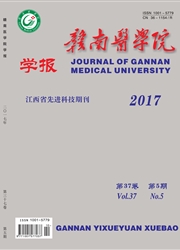

 中文摘要:
中文摘要:
目的:观察肿瘤坏死因子-α(tumor necrosis factor-α,TNF-α)对人脐静脉内皮细胞(HUVECs)组织型纤溶酶原激活物(tissue plasminogen activitor,t-PA)及其抑制剂-1(plasminogen activitor inhibitor-1,PAI-1)表达的影响。方法:原代分离HUVECs细胞并进行传代培养,分别以6个TNF-α浓度组(0、1、10、20、50、100 ng·m L-1)处理不同时间(0、1、3、6、12、24 h),酶联免疫吸附分析(ELISA)法测定t-PA、PAI-1抗原的表达;逆转-聚合酶链反应(RTPCR)检测t-PA、PAI-1基因的表达。结果:TNF-α促进PAI-1抗原的表达,并呈剂量和时间依赖关系,在TNF-α10 ng·m L-1作用6 h时最明显(P〈0.01);TNF-α促进PAI-1 mRNA的表达,并呈剂量和时间依赖关系,在TNF-α10 ng·m L-1作用3 h时已非常明显(P〈0.01),6 h时达到高峰(P〈0.01);而TNF-α对HUVECs表达t-PA抗原、mRNA无明显影响。结论:炎症因子TNF-α可能通过上调PAI-1表达而诱发血栓相关疾病。
 英文摘要:
英文摘要:
Objective: To observe the effects of tumor necrosis factor-α( TNF-α) on the tissue plasminogen activator( t-PA) and plasminogen activitor inhibitor-1( PAI-1) expression in human umbilical vein endothelial cells( HUVEC). Methods: Original HUVECs cell were isolated and subcultured. They were divided into six TNF-α concentration groups( 0,1,10,20,50,100 ng·m L- 1) and were dealt with in different hours( 0,1,3,6,12,24 h). The expressions of T-PA and PAI-1 antigen were determined by ELISA; t-PA mRNA and PAI-1 mRNA were examined by reverse transcription polymerase chain reaction( RT-PCR). Results: TNF-α promoted PAI-1 antigen expression in HUVECs in a dose or time independent manner,reaching a maximum level with TNF-α 10 ng·m L- 1after 6 hours( P 0. 01); TNF-α promoted PAI-1mRNA expression in HUVECs in a dose or time independent manner,being fairly apparent with TNF-α 10 ng·m L- 1after 3 hours( P 0. 01) and reaching a maximum level with TNF-α 10 ng·m L after 6 hours( P 0. 01); There were no effect on the t-PA antigen and mRNA exprssion induced by TNF-α in HUVECs. Conclusion: TNF-α may induce thrombosis related diseases by enhancing PAI-1 expression.
 同期刊论文项目
同期刊论文项目
 同项目期刊论文
同项目期刊论文
 期刊信息
期刊信息
